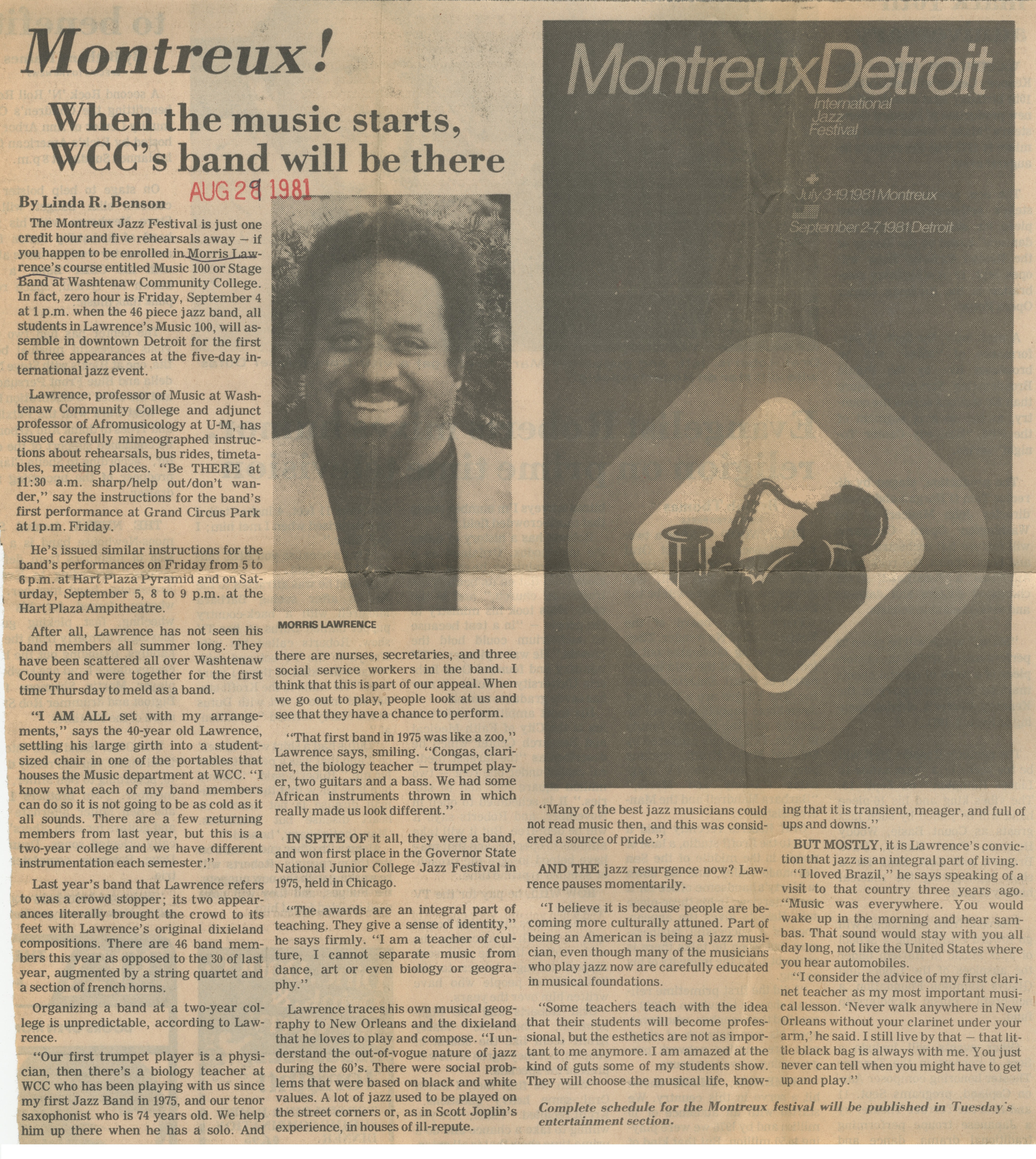Montreux!

Montreux!
When the music starts, WCC’s band will be there
By Linda R. Benson
AUG 29 1981
The Montreux Jazz Festival is just one credit hour and five rehearsals away - if you happen to be enrolled in Morris Lawrence’s course entitled Music 100 or Stage Band at Washtenaw Community College. In fact, zero hour is Friday, September 4 at 1 p.m. when the 46 piece jazz band, all students in Lawrence’s Music 100, will assemble in downtown Detroit for the first of three appearances at the five-day international jazz event.
Lawrence, professor of Music at Washtenaw Community College and adjunct professor of Afromusicology at U-M, has issued carefully mimeographed instructions about rehearsals, bus rides, timetables, meeting places. “Be THERE at 11:30 a.m. sharp/help out/don’t wander,” say the instructions for the band’s first performance at Grand Circus Park at lp.m. Friday.
He’s issued similar instructions for the band’s performances on Friday from 5 to 6 p.m. at Hart Plaza Pyramid and on Saturday, September 5, 8 to 9 p.m. at the Hart Plaza Ampitheatre.
After all, Lawrence has not seen his band members all summer long. They have been scattered all over Washtenaw County and were together for the first time Thursday to meld as a band.
“I AM ALL set with my arrangements,” says the 40-year old Lawrence, settling his large girth into a student-sized chair in one of the portables that houses the Music department at WCC. “I know what each of my band members can do so it is not going to be as cold as it all sounds. There are a few returning members from last year, but this is a two-year college and we have different instrumentation each semester.”
Last year’s band that Lawrence refers to was a crowd stopper; its two appearances literally brought the crowd to its feet with Lawrence’s original dixieland compositions. There are 46 band members this year as opposed to the 30 of last year, augmented by a string quartet and a section of french horns.
Organizing a band at a two-year college is unpredictable, according to Lawrence.
“Our first trumpet player is a physician, then there’s a biology teacher at WCC who has been playing with us since my first Jazz Band in 1975, and our tenor saxophonist who is 74 years old. We help him up there when he has a solo. And there are nurses, secretaries, and three social service workers in the band. I think that this is part of our appeal. When we go out to play, people look at us and see that they have a chance to perform.
“That first band in 1975 was like a zoo,” Lawrence says, smiling. “Congas, clarinet, the biology teacher - trumpet player, two guitars and a bass. We had some African instruments thrown in which really made us look different.”
IN SPITE OF it all, they were a band, and won first place in the Governor State National Junior College Jazz Festival in 1975, held in Chicago.
“The awards are an integral part of teaching. They give a sense of identity,” he says firmly. “I am a teacher of culture, I cannot separate music from dance, art or even biology or geography”
Lawrence traces his own musical geography to New Orleans and the dixieland that he loves to play and compose. “I understand the out-of-vogue nature of jazz during the 60’s. There were social problems that were based on black and white values. A lot of jazz used to be played on the street corners or, as in Scott Joplin’s experience, in houses of ill-repute.
“Many of the best jazz musicians could not read music then, and this was considered a source of pride.”
AND THE jazz resurgence now? Lawrence pauses momentarily.
“I believe it is because people are becoming more culturally attuned. Part of being an American is being a jazz musician, even though many of the musicians who play jazz now are carefully educated in musical foundations.
“Some teachers teach with the idea that their students will become professional, but the esthetics are not as important to me anymore. I am amazed at the kind of guts some of my students show. They will choose the musical life, knowing that it is transient, meager, and full of ups and downs.”
BUT MOSTLY, it is Lawrence’s conviction that jazz is an integral part of living.
“I loved Brazil,” he says speaking of a visit to that country three years ago. “Music was everywhere. You would wake up in the morning and hear sambas. That sound would stay with you all day long, not like the United States where you hear automobiles.
“I consider the advice of my first clarinet teacher as my most important musical lesson. ‘Never walk anywhere in New Orleans without your clarinet under your arm,’ he said. I still live by that - that little black bag is always with me. You just never can tell when you might have to get up and play.”
Complete schedule for the Montreux festival will be published in Tuesday's entertainment section.
Article
Subjects
Linda R. Benson
Washtenaw Community College - Students
Washtenaw Community College - Faculty & Staff
Washtenaw Community College
University of Michigan - Faculty & Staff
Music
Montreaux-Detroit Jazz Festival
Competitions
Awards Honors Prizes
Has Photo
Old News
Ann Arbor News
Morris J. Lawrence Jr.
Hart Plaza (Detroit)
Grand Circus Park (Detroit)